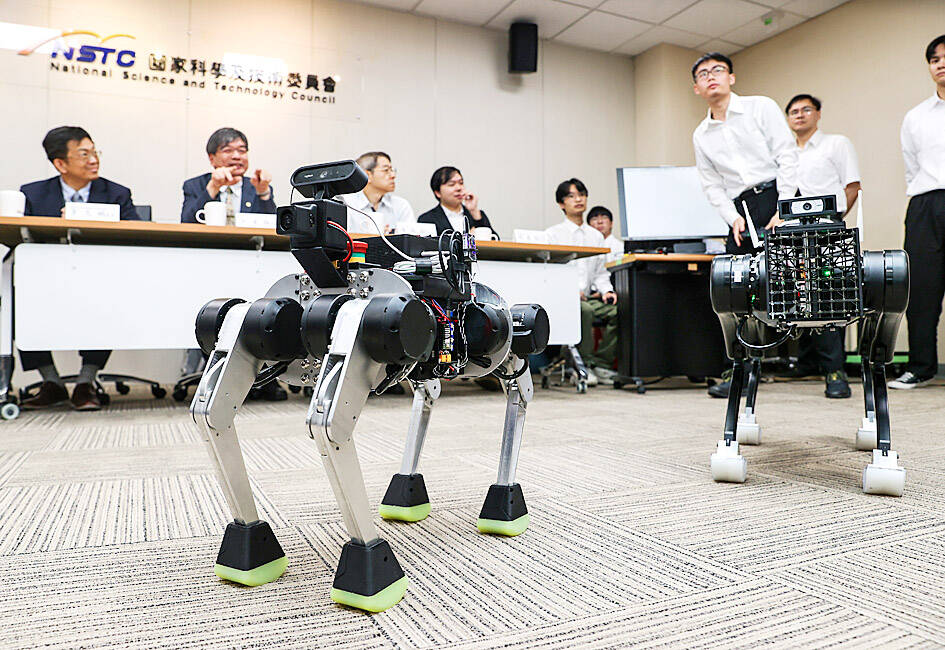National Taiwan University (NTU) yesterday unveiled Taiwan’s first artificial intelligence (AI) robot dogs, which can work in industrial settings to alleviate labor shortages and assist during rescue operations.
The team who worked on the “NTU DogBot” project, led by mechanical engineering professor Kuo Chung-hsien (郭重顯), demonstrated the two models, dubbed Oliver and Dustin, at the National Science and Technology Council’s headquarters in Taipei, as the council helped fund the project.
Kuo and council officials said the project is just the start of Taiwan’s AI robot dog industry, which would be competitive in the global market, as the robots’ projected production cost of US$50,000 is about 50 percent less than what companies from other countries have quoted.

Photo: CNA
Oliver, the “pet robot dog” version, weighs 16kg and is 54cm long, while Dustin, the “field operations robot dog,” weighs 40kg and is about twice the size, Kuo said.
As both are equipped with sensors, can navigate autonomously and are capable of AI learning, the team expects them to be able to climb stairs and move over complex terrain by the end of this year, he said.
The team developed the robots by integrating new technologies while working with domestic companies to gain an understanding of their potential applications in different industrial sectors, Kuo said.
They could help to alleviate Taiwan’s labor shortage, especially in the petrochemical, construction, railway, food delivery and service sectors, he said.
The four-legged robots can navigate complex terrain, and could also be used for rescue operations, Kuo said, adding that robot dogs have been used to film the inside of burning buildings before firefighters go in.
Dustin is suitable for industrial applications and food deliveries, as the robot has sensors that can pick up sound, temperature, gas and other readings, while Oliver has slightly different functions, as it can respond to voice controls and facial expressions, and is more suitable for the home environment, he said.
The NTU team began Taiwan’s AI robot dog project two years ago, in cooperation with the council, after finding that similar robots produced overseas were quite expensive and had problems integrating with Taiwan’s digital network and AI systems, Kuo said.

CHAOS: Iranians took to the streets playing celebratory music after reports of Khamenei’s death on Saturday, while mourners also gathered in Tehran yesterday Iranian Supreme Leader Ayatollah Ali Khamenei was killed in a major attack on Iran launched by Israel and the US, throwing the future of the Islamic republic into doubt and raising the risk of regional instability. Iranian state television and the state-run IRNA news agency announced the 86-year-old’s death early yesterday. US President Donald Trump said it gave Iranians their “greatest chance” to “take back” their country. The announcements came after a joint US and Israeli aerial bombardment that targeted Iranian military and governmental sites. Trump said the “heavy and pinpoint bombing” would continue through the week or as long

TRUST: The KMT said it respected the US’ timing and considerations, and hoped it would continue to honor its commitments to helping Taiwan bolster its defenses and deterrence US President Donald Trump is delaying a multibillion-dollar arms sale to Taiwan to ensure his visit to Beijing is successful, a New York Times report said. The weapons sales package has stalled in the US Department of State, the report said, citing US officials it did not identify. The White House has told agencies not to push forward ahead of Trump’s meeting with Chinese President Xi Jinping (習近平), it said. The two last month held a phone call to discuss trade and geopolitical flashpoints ahead of the summit. Xi raised the Taiwan issue and urged the US to handle arms sales to

State-run CPC Corp, Taiwan (CPC, 台灣中油) yesterday said that it had confirmed on Saturday night with its liquefied natural gas (LNG) and crude oil suppliers that shipments are proceeding as scheduled and that domestic supplies remain unaffected. The CPC yesterday announced the gasoline and diesel prices will rise by NT$0.2 and NT$0.4 per liter, respectively, starting Monday, citing Middle East tensions and blizzards in the eastern United States. CPC also iterated it has been reducing the proportion of crude oil imports from the Middle East and diversifying its supply sources in the past few years in response to geopolitical risks, expanding

Pro-democracy media tycoon Jimmy Lai’s (黎智英) fraud conviction and prison sentence were yesterday overturned by a Hong Kong court, in a surprise legal decision that comes soon after Lai was jailed for 20 years on a separate national security charge. Judges Jeremy Poon (潘兆初), Anthea Pang (彭寶琴) and Derek Pang (彭偉昌) said in the judgement that they allowed the appeal from Lai, and another defendant in the case, to proceed, as a lower court judge had “erred.” “The Court of Appeal gave them leave to appeal against their conviction, allowed their appeals, quashed the convictions and set aside the sentences,” the judges